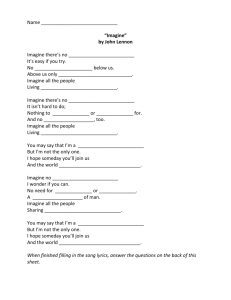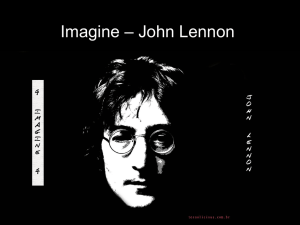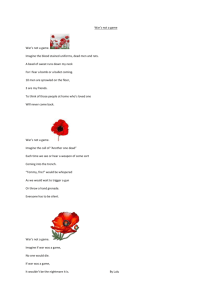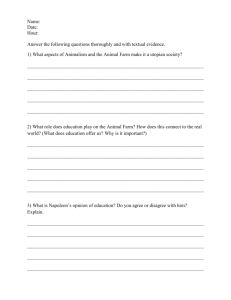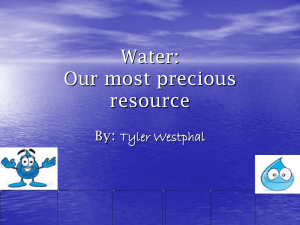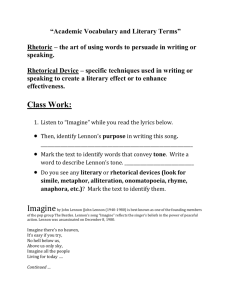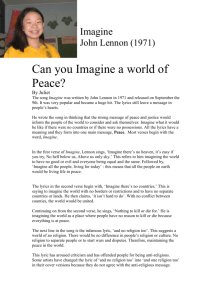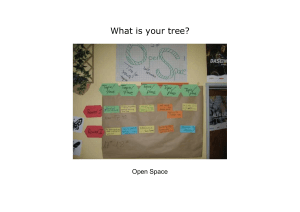Sample Rhetorical Analysis
advertisement
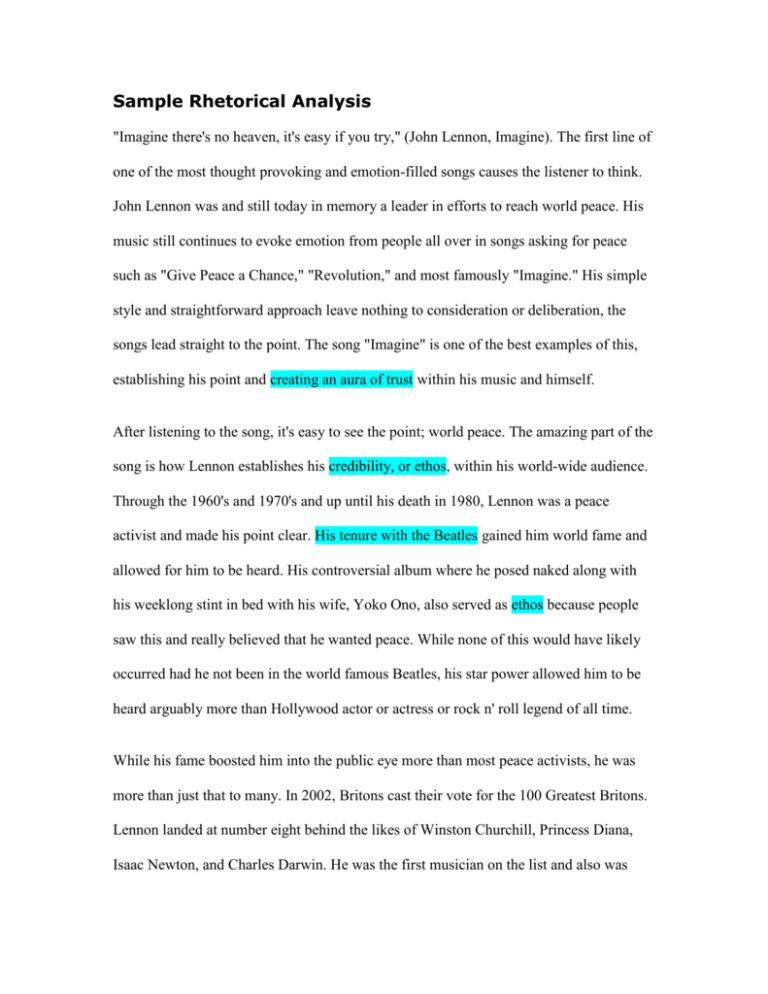
Sample Rhetorical Analysis "Imagine there's no heaven, it's easy if you try," (John Lennon, Imagine). The first line of one of the most thought provoking and emotion-filled songs causes the listener to think. John Lennon was and still today in memory a leader in efforts to reach world peace. His music still continues to evoke emotion from people all over in songs asking for peace such as "Give Peace a Chance," "Revolution," and most famously "Imagine." His simple style and straightforward approach leave nothing to consideration or deliberation, the songs lead straight to the point. The song "Imagine" is one of the best examples of this, establishing his point and creating an aura of trust within his music and himself. After listening to the song, it's easy to see the point; world peace. The amazing part of the song is how Lennon establishes his credibility, or ethos, within his world-wide audience. Through the 1960's and 1970's and up until his death in 1980, Lennon was a peace activist and made his point clear. His tenure with the Beatles gained him world fame and allowed for him to be heard. His controversial album where he posed naked along with his weeklong stint in bed with his wife, Yoko Ono, also served as ethos because people saw this and really believed that he wanted peace. While none of this would have likely occurred had he not been in the world famous Beatles, his star power allowed him to be heard arguably more than Hollywood actor or actress or rock n' roll legend of all time. While his fame boosted him into the public eye more than most peace activists, he was more than just that to many. In 2002, Britons cast their vote for the 100 Greatest Britons. Lennon landed at number eight behind the likes of Winston Churchill, Princess Diana, Isaac Newton, and Charles Darwin. He was the first musician on the list and also was ahead of figures such as the famous philosopher and lawyer Thomas Moore, Queen Elizabeth II, King Henry VIII, Tony Blair, and two of his Beatles counterparts Sir Paul McCartney and George Harrison (Wikipedia). His ethos was created within his people, not where he derived his ideas. He felt the feelings that the world felt, and thus established his credibility. As for the song "Imagine," his somewhat radical and borderline socialist views sang to the people and they believed in his words. He also establishes ethos in several parts of the song, mainly, "You may say that I'm a dreamer, but I'm not the only one, I hope someday you'll join, and the world will be as one." He does not directly include anyone else in these lyrics, but he does make a statement that he is not the only person who believes in the idea. Another point in the song where he establishes this is when he says "Imagine no possessions, I wonder if you can," (Imagine). This is so powerful because he had everything he could have ever wanted after reaching super stardom with The Beatles. Having someone with everything say (and truly mean) imagine if we didn't have anything at all that people could fight over means a lot more than someone who doesn't have it all. This, however, establishes more credibility on the fact that he actually truly means what he feels and causes the listener to feel more strongly towards the points he is making. The song would not nearly be as powerful if it were just poetry, while it still would bring out emotion; he establishes his pathos with the music that goes along with it. Lennon's melodic piano and light use of other instruments makes the song feel very personable as if he is speaking only to you. Unlike "Revolution" where the song is more in your face, "Imagine" is slow and mellow to the point where it seems to make you relax and truly imagine what life would be like. His tranquil melody and soothing voice in the song also cause listeners to almost sympathize with the world. His argument in the song is laidback and not telling the people to change right now. He chose a passive approach to this song just asking people to think about it, not to get up in arms and force a change. While he still wanted the change to occur, his approach was much more effective than he would have been had it been an aggressive argument for his case. Personally, every time I hear the song I think of what life would be like and how peaceful things would be if the world listened and acted upon what he was saying. The culmination of the mood of the song and the powerful lyrics presented generate these emotions and thoughts, making it a much more influential song than many others of his time. He also establishes his pathos within his lyrics at the end of each verse by saying "Imagine all the people living for today," or "Imagine all the people living for today," (John Lennon, Imagine"). These words create thoughts and feelings that maybe it is possible, and also creates thoughts of what life would really be like in those circumstances. He also establishes his pathos within his style of lyrics. He is repetitive in the fact that every verse starts with "Imagine…," (John Lennon, Imagine). Much like Martin Luther King's I Have a Dream speech, he emphasizes his point to truly imagine what things would be like by repeating it over and over. He constantly brings it up throughout the song; forcing listeners, such as myself, to continuously feel the emotion and deeply think about the changes that could be made in the world. Lennon also uses several different logos to prove his point. In this song, he chooses to use artistic logos as opposed to inartistic ones. There are no hard facts or evidence to prove that his ideas are correct, but common knowledge helps establish his points. For example, when Lennon says "Imagine there's no countries," and then later says "Nothing to kill or die for, and no religion too. Imagine all the people living life in peace," (John Lennon, Imagine). People know that wars are fought every day solely based on religion and land, such as the current civil war in the Middle East. By bringing up these points he is creating logos, and using basic knowledge to prove his point. He is essentially saying if there weren't religion or separate countries, then what is there to fight about? He also uses logos when he says "Imagine no possessions, I wonder if you can. No need for greed or hunger, a brotherhood of man," (John Lennon, Imagine). Another common known fact is that people fight for what they want and need. By eliminating this and sharing for the better of mankind, war would also be prevented. Again, this is an effective use of artistic logos. While Lennon is no longer with us, his views and music continue to influence people today. His effective use of ethos, pathos, and logos help preserve them and allow them to still cause emotions 25 years after they are written. While he may never have been a politician or public speaker, he still was able to get his points and views across to the world such as his cry for world peace in "Imagine."
